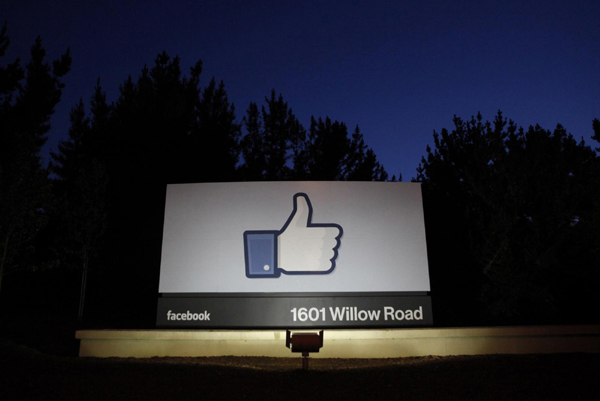Facebook "confessions" draw kids, worry adults
Updated: 2013-03-19 10:36
(Agencies)
|
||||||||
 |
|
The sun rises behind the entrance sign to Facebook headquarters in Menlo Park, California, in this May 18, 2012 file photo. [Photo/Agencies] |
March 18 - "I'm a compulsive laundry room thief," says one Facebook confession. "I'm the reason the 'Public Urination is Illegal' signs were put up at Coyote Village," says another.
"I sold books for the semester to go to South Padre for spring break ... Gotta pay for the booze somehow," reveals yet another poster.
By turns rueful and raunchy, these anonymous admissions pop up on 'campus confession' pages unofficially linked to scores of high schools and universities.
Like many social media trends, the confession craze captivates teenagers and 20-somethings - but alarms teachers, law enforcement officers and counselors.
"It's another creative venue where kids are able to say hurtful things, and that's frustrating," said Sameer Hinduja, co-director of the Cyberbullying Research Center at Florida Atlantic University.
At the same time, the pages can sometimes offer a catharsis of sorts, attracting heartfelt disclosures from students struggling with depression, alcoholism or eating disorders. Classmates often respond with links to counseling sites and offers to talk.
The anonymity of confession pages is at the core of their appeal, and they use a simple workaround to Facebook's general insistence that people use their real identity on the social network.
Students who set up confessional pages must do so under their real names, as per Facebook policy. But they can choose to cloak their identity as page administrators. To keep posts anonymous, they use free online survey tools such as SurveyMonkey or Google Forms. Confessors simply click on a link to open up a blank box where they can type their tell-all.
The page administrator doesn't see identifying information - just the latest confession.
The pages then prompt visitors to show admiration for the juiciest confessions by "liking" them and posting comments - often smart-aleck remarks that can draw fan bases of their own.
"The more outrageous comments attract more attention ... so there's little incentive to exercise restraint," Hinduja said.
Alisen Lafaive found that out quickly when she began reading the Facebook confession page for Clarkson University in Potsdam, New York. "At first, I thought, 'Ooh, Clarkson Confessions! This ought to be juicy!'" said Lafaive, a junior. Then she began scrolling through posts filled with crude invective toward women.
"These things are mean," she said. "My feelings are hurt even though none of it's directed toward me." She posted a plea for courtesy but was ignored.
The confessions pages do not violate Facebook rules so long as the content remains within the bounds of civility, said a spokeswoman for the social network. But the pages have drawn complaints from some principals, college administrators and police.
Dismayed by the content on two high-school confession pages in Kalispell, Montana last month, police asked Facebook to shut them down. Facebook closed one and removed offensive comments from another - but the student instigators simply started a third page, said Jason Parce, a police officer in Kalispell.
Parce threatened to charge participants with defamation and they quickly pulled down their posts. Though some posts were anonymous, many comments came in through Facebook accounts so the writers could easily be identified.
"There was a lot of sexually explicit content directed at specific individuals and a lot of hateful language being used," said Parce. "Absolutely, kids are more willing to be crude when they don't have to face anyone. They hide behind the computer."
High-school pages in Idaho and Arizona have also been shut down after school officials moved to investigate offensive posts.

 Li Na on Time cover, makes influential 100 list
Li Na on Time cover, makes influential 100 list
 FBI releases photos of 2 Boston bombings suspects
FBI releases photos of 2 Boston bombings suspects
 World's wackiest hairstyles
World's wackiest hairstyles
 Sandstorms strike Northwest China
Sandstorms strike Northwest China
 Never-seen photos of Madonna on display
Never-seen photos of Madonna on display
 H7N9 outbreak linked to waterfowl migration
H7N9 outbreak linked to waterfowl migration
 Dozens feared dead in Texas plant blast
Dozens feared dead in Texas plant blast
 Venezuelan court rules out manual votes counting
Venezuelan court rules out manual votes counting
Most Viewed
Editor's Picks

|

|

|

|

|

|
Today's Top News
Live report: 7.0-magnitude quake hits Sichuan, heavy casualties feared
Boston suspect cornered on boat
Cross-talk artist helps to spread the word
'Green' awareness levels drop in Beijing
Palace Museum spruces up
First couple on Time's list of most influential
H7N9 flu transmission studied
Trading channels 'need to broaden'
US Weekly

|

|







